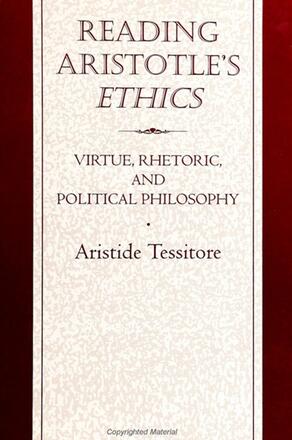
Reading Aristotle's Ethics
Virtue, Rhetoric, and Political Philosophy
Alternative formats available from:
Description
Presents the Nicomachean Ethics as a work of political philosophy, emphasizing the interplay between its practical political concerns and its underlying philosophic perspective and arguing that it is rhetorical in the precise Aristotelian meaning of the term.
Aristide Tessitore is Associate Professor of Political Science at Furman University.
Reviews
"Tessitore presents a consistent and well-supported argument that the Nicomachean Ethics is aimed at a dual audience of both politically engaged citizens and philosophers, and that the complexity of Aristotle's rhetorical purpose is a key to understanding the subtlety of his message. This is an important work, which opens up a new way of reading the Ethics and sheds light on many of the most vexed questions in Aristotle scholarship." -- Thomas L. Pangle, University of Toronto
"By paying attention to the diversity of Aristotle's intended audience in the Ethics, and with that to the diverse purposes motivating the argument, Tessitore's reading makes a distinctive and useful contribution to the prominent contemporary debate about Aristotle's teaching concerning the good life for human beings, in particular, the relation in it between moral virtue and theoretical activity." -- Ronna Burger, Tulane University
"This work has more than its share of sharp insights, important clarifications, and new and intriguing problems for readers of Aristotle. The prose is clear and accessible throughout without any undue simplification, the scholarship is excellent, covering the relevant literature in German and French as well as English, and the interpretive arguments are clearly drawn and persuasive." -- Stephen Salkever, BrynMawr College
"What is fascinating about Tessitore's presentation is this: he tries to solve the basic puzzles that have bedeviled scholars for generations--but he does so in an entirely novel way. Instead of trying to square the circle and prove that Aristotle nowhere contradicts himself, he traces the tensions within the peripatetic's text to the rhetorical problems faced by its author. Tessitore makes a compelling case that, in this work and in The Politics, Aristotle addresses two different audiences, potentially at odds with one another, with an eye to reconciling them. In my judgment, he does a remarkable job. I found reading the book exciting." -- Paul A. Rahe, author of Republics Ancient and Modern